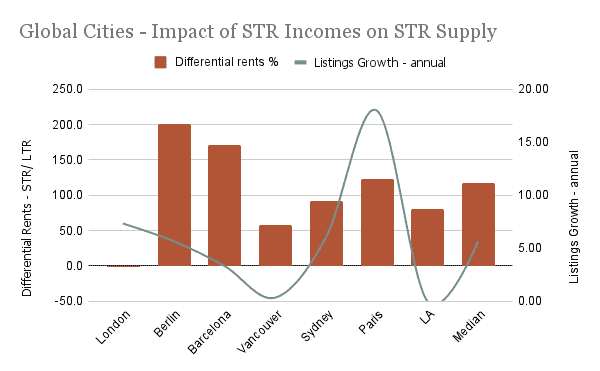Advocacy group calls for regulatory measures

Airbnb is exacerbating housing shortages and driving rental prices out of reach in major cities worldwide, according to a new report by Australian-based Grounded Community Land Trust Advocacy.
“Airbnb investor returns far exceed traditional property investors – by a shocking 118%,” said Karl Fitzgerald (pictured above), managing director of Grounded Community Land Trust Advocacy. “This was measured across global cities Berlin, Barcelona, Vancouver, London, LA, Paris and Sydney.”
“As returns rise for Airbnb investors, local residents struggle to find stable and affordable housing, impacting the social fabric of communities and perpetuating inequality.”
In Berlin and Barcelona, the study found that gross short-term rental (STR) earnings were 201% and 171% higher, respectively, than long-term rentals (LTR). Active Airbnb listings in these cities are growing at 5.6% annually, while average income growth for STRs has been a modest 3% across 337,500 listings.
The Grounded report also highlights the situation in Australia, where STR earnings are 81% higher than those of traditional landlords. This has resulted in 74% of new housing supply being directed towards short-term rentals.
To address the issue, Grounded proposes implementing a cap-and-trade system to limit the growth of STRs and redirect profits from Airbnb towards Community Land Trusts (CLTs). The proposed system would cap the number of Airbnb properties, gradually reducing the number of licenses and pushing surplus supply back into the traditional housing market.
“The revenue raised is significant,” Fitzgerald said, noting that Paris could generate $140 million in its first year alone while still leaving Airbnb owners with $920 million in net earnings. “The alternative is for more cities to cancel Airbnb, as New York and Barcelona have.”
CLTs are seen as a key solution, offering perpetually affordable housing that prioritises local residents. Grounded’s report argues that these trusts could provide much-needed stability amid the speculative pressures on urban housing markets.

“The data underscores the urgent need for capping and funding alternatives like CLTs to provide resilience to such change,” Fitzgerald said.
The study also found that Airbnb earnings have led to increased activity in several markets, with Berlin experiencing a 15% increase in earnings and a 17% growth in active listings. Barcelona saw a 15% income growth, resulting in a 10% rise in active listings over the past three years. In London, despite STR incomes being lower than LTRs, listings surged by 22% in the same period.
“Airbnb is enforcing rapid change that squeezes communities sideways as short-term profits reign supreme,” Fitzgerald said. “CLTs can add resilience to that local community, ensuring its long-term survival.”
Want to be regularly updated with mortgage news and features? Get exclusive interviews, breaking news, and industry events in your inbox – subscribe to our FREE daily newsletter. You can also follow us on Facebook, X (formerly Twitter), and LinkedIn.



